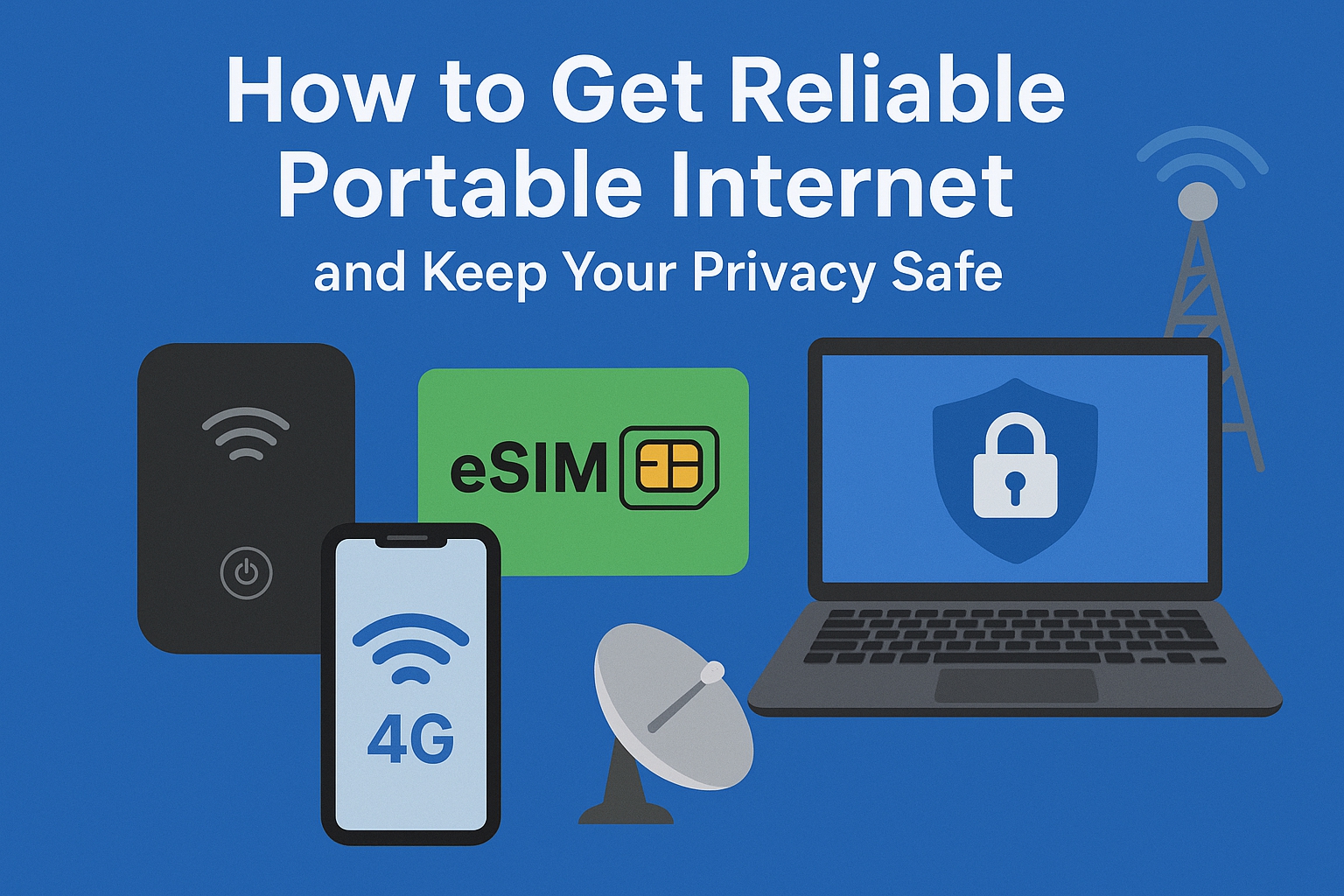Why portable internet matters (and why privacy matters too)
Whether you’re a digital nomad hopping between cafés, a field engineer working off-grid, or simply someone who hates flaky hotel Wi-Fi, portable internet is a lifesaver. From pocket Wi-Fi and eSIMs to USB modems and even satellite roam, there’s a fit-for-purpose solution for almost every situation.
But there’s another side to the story: with so many ways to stay connected, your location, traffic and sometimes even conversations can be exposed. That’s where privacy tools – from VPNs to (in strictly controlled, lawful contexts) signal blockers – come into play. This guide explains the portable internet landscape, helps you pick the best option, and shows when a privacy jammer might actually be a sensible tool – legally and safely.
1) Pocket Wi-Fi (portable router) – best for groups & multi-device use
What it is: A battery-powered hotspot that uses a local SIM/eSIM to create Wi-Fi for multiple devices.
Why choose it: Connect phones, laptops and tablets at once; great for families, small teams, or hotel stays.
Look for: battery life, simultaneous device limit, carrier compatibility, and eSIM support.
Privacy tip: Use a VPN on every device; avoid public hotspots without encryption.
2) Data SIM cards – simple and cheap for single-device use
What it is: A physical SIM that you pop into a phone or tablet for mobile data.
Why choose it: No extra gadget required, wide device compatibility, lots of prepaid plans.
Look for: coverage in your travel area and data caps.
Best for: Travelers who use one phone or tablet and want the lowest hassle.
3) eSIMs – instant, flexible, travel-friendly
What it is: A digital SIM profile you download to your phone – no plastic card needed.
Why choose it: Activate before you land, manage multiple carriers on one device, quick top-ups.
Look for: supported carriers and device compatibility (most modern phones support eSIM).
Best for: frequent travelers who move between countries often.
4) USB modems (dongles) – laptop-first solution
What it is: A plug-in modem that gives your laptop direct mobile data.
Why choose it: Compact, reliable for single-device work, good backup if Wi-Fi fails.
Look for: driver support, band compatibility, and integrated SIM slots.
Best for: remote workers who primarily use a single laptop.
5) Portable satellite (Starlink Roam & similar) – when nothing else works
What it is: A sat-link device that connects directly to satellites for broadband anywhere.
Why choose it: Reliable in remote areas with zero cellular coverage.
Tradeoffs: Higher cost, bulkier hardware, and often subscription fees.
Best for: expedition teams, remote professionals, and emergency response.
6) Tethering / Mobile Hotspot – emergency convenience
What it is: Share your phone’s mobile data with other devices.
Why choose it: Built into every smartphone; great for short emergency use.
Downside: Drains the phone battery fast and isn’t ideal for long sessions or many devices.
7) Public Wi-Fi + VPN – cheap but risky without precautions
Public networks are handy – but always pair them with a VPN to encrypt traffic and hide your real IP. Use multi-factor authentication for critical accounts and avoid banking on open Wi-Fi.
When you might consider a signal blocker (and what responsible use looks like)
Short answer: Only in narrow, lawful scenarios. Signal blockers (cell jammers, GPS blockers, Wi-Fi silencers) can create temporary “radio-free” zones that protect privacy – for example, in secure boardroom briefings, exam halls, or certain law enforcement operations. They are not a catch-all privacy hack for daily life.
If you’re thinking about a blocker, consider:
- Legal status: Many countries strictly forbid consumer jammers. Always verify local law and get written authorization if acting on behalf of an organization.
- Scope & selectivity: Modern, reputable systems let you block specific bands (e.g., GPS L1) instead of a blanket blackout – less collateral damage.
- Alternatives first: For many needs, physical isolation (collecting phones), Faraday bags, controlled Wi-Fi networks or strict device policies are safer and lawful.
- Professional deployment: For legitimate use (corporate secure rooms, prisons, law enforcement), work with certified vendors who provide compliance documentation and shielding plans.
How to pick the right portable internet + privacy combo
- Solo traveler / light user: eSIM or prepaid data SIM. Add a VPN.
- Family / group: Pocket Wi-Fi with a multi-device data plan.
- Laptop-heavy worker: USB modem or tether to phone + external battery.
- Remote pro / no coverage: Satellite solution (Starlink Roam, etc.).
- Privacy-first meetings: Combine secure policies (no phones), Faraday pouches, or – if lawful and authorized – managed signal suppression with a reputable provider.
Quick buying checklist (portable hardware & privacy tools)
- Band compatibility (check the countries you’ll visit)
- Battery runtime and charging options (USB-C, car charging)
- Number of simultaneous connections (for routers)
- VPN service reputation and speed (no-logs policy)
- For blockers: certification, band-selectivity, vendor support, and legal compliance documentation
Final words – connectivity is freedom, privacy is a choice
Portable internet keeps us productive and connected – but it’s a double-edged sword if you don’t safeguard privacy. Start with the right connectivity tool (eSIM, pocket Wi-Fi or satellite), harden your setup with a VPN and good device hygiene, and treat signal blockers as a last-resort, professional tool – not a casual gadget.
If you’d like, we can help you pick the best portable router, eSIM plan, or a compliant privacy solution tailored to your travel profile – or explain how specific jammer types (GPS, Wi-Fi, or cellular) compare for legitimate, approved use cases. Contact our team for product recommendations and legal compliance support.

